
Homebuyers paid £1bn in stamp duty land tax in March, an increase of 19 per cent on the previous month. In cash terms, that is a jump of £164m.
Across the year as a whole, £15.4bn was paid out in stamp duty over the 2022-23 tax year, an increase of nine per cent on the £1.3bn paid out in the previous tax year and a new record.
However, this is expected to drop sharply in the 2023-24 tax year. The Office for Budget Responsibility for example has forecast it will drop by £4.7bn due to the anticipated lower numbers of property transactions.
Jonathan Stinton, head of intermediary relationships at Coventry Building Society, noted that with record amounts being paid in stamp duty, it is clear that even the new tax thresholds introduced in September “aren’t doing enough”.
He said: “The stamp duty holiday in 2020 and 2021, and the subsequent boom in property transactions, showed just how influential stamp duty can be. An ambitious and active reform to the property tax could inject life into the market. Alternatively, we could see a structured, concerted effort to increase the supply of new homes which would then allow aspiring first-time buyers more choice, and perhaps a smaller tax burden.”
Helen Morrissey, head of retirement analysis at Hargreaves Lansdown, noted that the sizeable stamp duty receipts had been “bolstered” by strong house price growth earlier in the year, but cautioned: “The uncertain market outlook means we could see receipts more muted over the coming months.”
Rising inheritance tax receipts
The HMRC data also highlighted a sharp increase in inheritance tax receipts. Over the year, a total of £7.1bn was paid in inheritance tax, up by £1bn from the previous year.
Morrissey commented: “This is largely down to the ongoing freezing of thresholds which means more and more households are being caught in its trap – it’s certainly not a rich person’s tax any more as years of strong house price growth drag more of middle Britain into its orbit.”
















